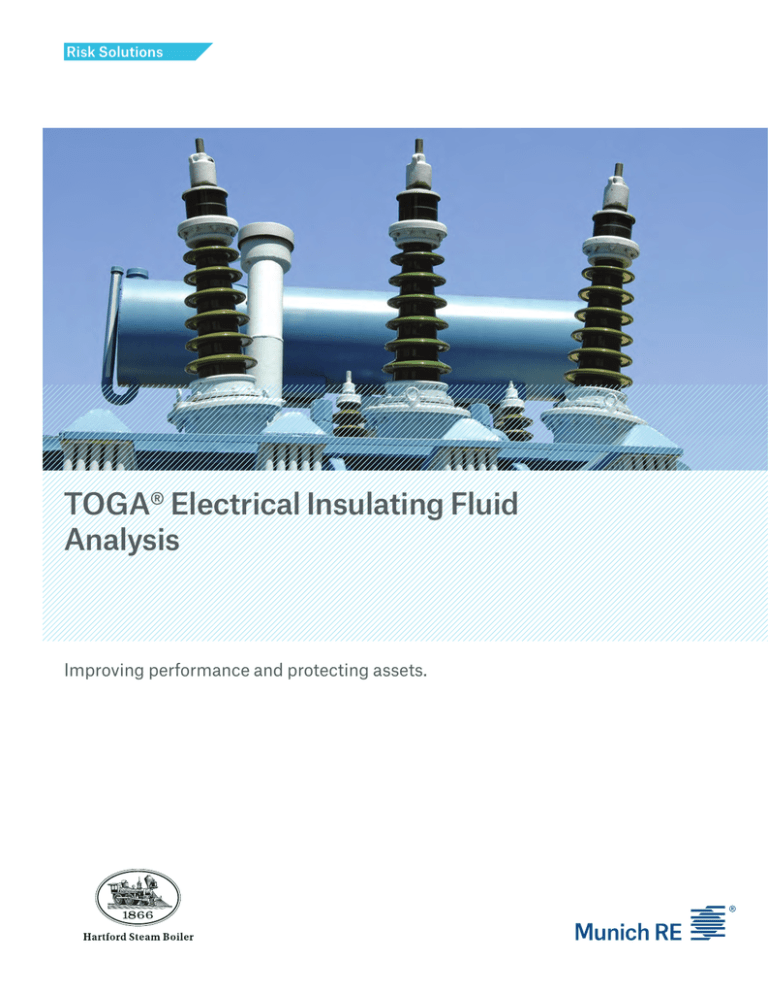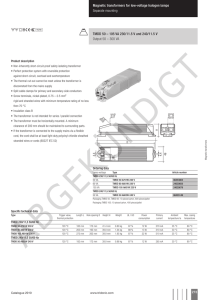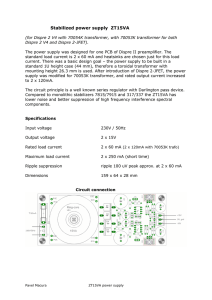
TOGA® Electrical Insulating Fluid
Analysis
Improving performance and protecting assets.
It happens all the time - transformers fail
unexpectedly, and there are often no external
visual clues on what caused a breakdown.
But, testing the transformer insulating fluid
can help predict a failure before it happens.
The key to testing is gaining an accurate
evaluation of the test results. Hartford Steam
Boiler‘s Transformer Oil Testing Program
(TOGA®) does just that.
Case study: Preventing loss
TOGA testing discovered arcing in a
10 MVA transformer. TOGA samples
showed the transformer operation
stable after returning to service but
we suspected lightning damage. A
damaged conductor was found
which was easily repaired at a
scheduled outage. It was repaired at
a cost of $50,000 as opposed to the
unit’s total cost of $300,000 and it
did not require an expensive forced
outage.
A lot of companies offer insulating
fluid testing, but…
HSB gives you a competitive edge by helping
you better manage your electrical equipment
assets. TOGA uses proven technology and
engineering know-how to protect the
integrity of your transformer. TOGA has been
keeping transformers on-line and in business
since 1985. TOGA’s unique, interpretive
program improves performance and asset
protection through:
−−Consistent sample extraction
−−Repeatable laboratory analysis
−−Accurate results evaluation and trending
−−Experienced, actionable intelligence
−−Technical guidance for results
Munich Re TOGA®
1
Why sample?
Transformer failures can mean more than
equipment replacement costs. A breakdown
or failure can totally or partially shut a plant
down and threaten your competitive edge as
your uptime plummets and your revenues are
compromised.
For example: Testing the insulating liquid on
a 170 MVA generator step-up transformer at
a medium-sized coal fired power plant
identified abnormal carbon dioxide to carbon
monoxide ratios. The test also showed higher
than expected temperatures at low-power
production loads. This transformer model
also had a history of fluid distribution
problems resulting in a poorly cooled core.
Over time, these higher temperatures would
have compromised the insulation,
accelerating the rate of aging and reducing
the useful life of the transformer.
Instead, a $20,000 repair was performed
during the next scheduled outage. Had this
problem not been identified early through
2
Munich Re TOGA®
fluid testing, equipment replacement could
have cost up to $1.5 million. Further, if the
transformer unexpectedly failed without a
ready replacement, it would have shut the
unit down for six months with business
interruption expense of up to $10 million.
Transformer failure rates
−−5 to 30 of 1,000 power
transformers fail based on IEEE
survey
−−5.8 of 1,000 HSB insured
transformers fail based on HSB
data
−−1.5 of 1,000 TOGA transformers
failed from all causes
TOGA, a proven early warning
system
When transformer insulation experiences an
electrical or thermal fault, combustible gases
become dissolved in the oil. Analyzing the
insulating fluid for these gases gives
important information of current issues and
potential problems. This information can then
be used for developing maintenance
programs that help prevent costly failures
and power interruptions. That’s how TOGA
acts as an early warning system to help
preserve your assets.
Some transformer failures occur without
warning while some progress to failure over
days, months and years. TOGA gives you
tools to help identify failure types and keep
your fluid-filled equipment healthy. Analysis
of our claims database shows that the TOGA
program could have identified about 50% of
transformer failures before they occurred. A clearer picture through
comprehensive testing
TOGA detectible
Causes of Transformer Failures
%TOGA
Name
Benefits
lElectrical Disturbances
28
lOther
27
lLightning
13
lDefective Insulation
9
lElectrical Connection
6
lOverload
4
lForeign objects
4
lMoisture
4
lLine Disturbance
3
lStress/Fatigue
2
No single test can give a true picture on the
condition of your fluid-filled electrical
equipment. That’s why TOGA uses a number
of different testing techniques to accurately
identify fluid-filled electrical equipment
abnormalities.
Our laboratories are recognized leaders in
analysis of insulating fluid and TOGA
provides you with the most effective battery
of tests for your specific equipment. TOGA
also recommends the proper sample
frequency needed to monitor your
equipment. Using the latest technology,
TOGA has the technical capability,
experience and the knowledge to enhance
your electrical equipment reliability and
performance. Our program provides in-depth
information about electrical equipment to
help users better plan maintenance
schedules, avoid unnecessary downtime and
better manage capital equipment assets.
Munich Re TOGA®
3
Routine TOGA tests
Dissolved Gas-in-Oil Analysis (DGA) gives
an early indication of abnormal behavior of
equipment by analyzing the types and
quantities of combustible gases dissolved in
the fluid. TOGA typically analyzes for
hydrogen, oxygen, nitrogen, carbon
monoxide, carbon dioxide, methane, ethylene,
ethane and acetylene. Certain quantities and
combinations of these gases indicate
insulation overheating/overloading, liquid
overheating, partial discharge (corona), or
abnormal arcing or heating inside
transformers, load tap changers and oil
circuit breakers. For example, the presence of
acetylene is typically associated with arcing
activity. We use DGA for most insulating
fluids like mineral oil, ester based and silicon
fluids. Data from a dissolved gas analysis can
provide:
−−Advance warning of developing faults
−−Evidence of improper application of the unit
−−Status checks on new and repaired
equipment
−−Information for use in scheduling repairs
4
Munich Re TOGA®
Screen testing evaluates the physical,
electrical and chemical properties of the
insulating fluids like mineral oil, esters and
silicon fluids. These tests gage how suitable
the insulation liquid is for the intended
application.
TOGA‘s screen tests include:
−−Dissipation factor@ 40°C
−−Interfacial tension
−−Acidity
−−Color
−−Dielectric strength
−−Dissolved moisture
−−Specific gravity
Case study: Overload
Additional fluid tests
An auxiliary transformer which
supplies power to plant motors
developed a high resistance
connection in the de-energized tap
changer. A forced outage during the
peak generating season is expensive,
so TOGA was used to monitor the
fault progression. The dissolved gas
analysis monitored the active fault
until a step change indicated a
deterioration in the unit’s condition.
A plant outage was scheduled, repair
parts were ordered, and a successful
planned outage repair was
completed. A transformer failure
would have caused a power plant trip
resulting in a multi-day forced
outage to repair and reconfigure the
electrical system.
Polychlorinated biphenyls (PCBs), furan, and
particle count tests, and spectroscopy are
used to confirm equipment status or assist
with troubleshooting a problem. The
corrosive sulfur test stresses the fluid under
laboratory conditions. Then an observation is
made on copper and paper-wrapped copper
strips for the presence of corrosive sulfur.
Metals-in-oil testing analyzes the presence of
metals to provide vital information about
fault locations and excessive wear in
mechanical components. TOGA uses
spectroscopy to report metals and
contaminates. Furan analysis estimates the
degradation of solid insulation. This test can
also be used to assess the relative expended
life of the transformer insulation.
More than testing, you gain an
understanding
Knowing the condition of your equipment not
only helps avoid losses, it also helps you work
smarter. TOGA’s interpretive engineering
reports give your maintenance staff the
knowledge they need to establish priorities,
plan work assignment schedules, arrange
outside service, and order parts and
materials. Our service includes an interactive
web site to help you track:
−−Online sample orders
−−Online report review for current testing
results
−−Online view of historical data and trending
−−Secure Internet site for your engineers and
local maintenance personnel
TOGA can help identify the root causes for
transformer failures. Many transformer
breakdowns are the result of insulation
deterioration. Overheating and internal
electrical faults such as arcing or partial
discharge (corona) cause transformer
insulation to break down over time.
Insulating liquid contaminated with moisture
and aging byproducts can accelerate the
deterioration of the insulation system. We
help identify this problem and more to keep
your equipment healthy and on-line.
Other services
TOGA® Lube Oil, Hydraulic and Heat
Transfer Fluid Analyses
HSB Infrared Thermography Services
Secure superior performance. Gain a
competitive advantage. Add technical
support to your staff without increasing
headcount. Call us toll-free (800) 386-2675
(USA only) or (484) 582-1866.
Visit our website at www.hsbtoga.com for
more information.
1-(800) 386-2675 (USA only)
(484) 582-1866
One State Street, Hartford, CT 06102-5024
www.hsbtoga.com
Munich Re TOGA®
5
Hartford Steam Boiler
One State Street
P.O. Box 5024
Hartford, CT 06102-5024
Tel: (800) 472-1866
www.hsb.com
© 2013
The Hartford Steam Boiler
Inspection and Insurance Company.
All rights reserved.
HSB-076 (New 11/12)
NOT IF, BUT HOW



